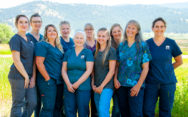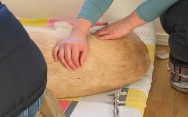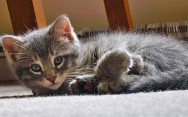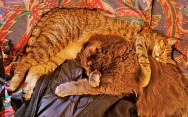Animals love coming to our relaxed clinic for treatments.
Monthly Archives: January 2014
Our philosophy is based on using the best resources to care for your pet.
Proyecto Felino in Cuba, 2009
On my first visit to Cuba in 2008, I helped with spay and neuter clinics in Havana. The veterinarians there are skilled surgeons and very knowledgeable. It was a mystery, then, why during these spay campaigns they shared needles between patients, because that would not be acceptable in practices in developed countries. When asked about the feline retroviruses, Feline Leukemia (FeLV) and Feline Immunodeficiency Virus (FIV), the veterinarians replied that they don’t have those in Cuba.
The truth is actually that due to the isolation of this country, no one had ever tested for the presence of these viruses on the island. And the veterinary schools of Cuba do not teach their students about companion animal medicine, only about production animal medicine. So their understanding of physiology and anatomy and disease is very sound, but their education about specific diseases and disorders of small animals has to be acquired in other ways. Internet access is scarce, travel outside the country is difficult if not impossible for Cubans, and text books are very hard to come by.
In production animal medicine, it is the standard of care in most areas to share needles between patients. When I worked with cattle in eastern Montana, it was standard practice to load a syringe to deliver 25 doses of vaccine with the same needle. It is no wonder the Cubans were conserving hypodermic needles, which are also a scarce resource, by using them for multiple patients.
Upon returning to the US after that first visit, I had to find a way to determine whether the feline retroviruses are present on the island. Not only is it essential to disease prevention, but it is an interesting epidemiological question – Cuba has been relatively isolated since the emergence of these viruses elsewhere. Testing is expensive, but Idexx generously donated 300 test kits for detection of FeLV and FIV. Securing approval from Cuban authorities to do this project was more difficult. It took two visits but it was ultimately approved, along with a request for my participation in a lecture on feline viruses for veterinarians in Havana.
The test kits were brought into the country with permission from Customs, and prepared for distribution to four Havana clinics for the study. The lecture presentation was given in Spanish to a packed room of 35 or 40 attentive veterinarians, with a translator to help me with the hard parts. We talked about some of the common viruses, their symptoms and management, and also the retroviruses, which can live undetected in cats for years before causing disease and death. These veterinarians are a sharp group and were full of questions and ideas. They listened to the importance of not sharing needles between patients, and avoiding any transmission of viruses even between cats that appear healthy. It is so ingrained in our culture now that it’s difficult to imagine it’s different anywhere else, so I had to make a pretty convincing pitch.
Then I demonstrated the test kits that Idexx had donated, first with pictures, and then we actually did a test on the cat my translator brought, who looked as healthy as can be. We all watched anxiously for the result, which appeared after 10 minutes. It was a powerful demonstration of the need for this knowledge – the kitty was positive for FeLV. All of the veterinarians in the room are committed to sharing this information and awareness to prevent the unintentional and needless infection of other cats. I would like to take this message to other parts of the country, and have started making connections in other provinces.
Hopefully we can make it easier for Cuban veterinarians to take care of people’s beloved pets (and they do love their pets, more than any other Latin American people I’ve seen) once there is increased openness and trade between our countries. In the meantime, my friend Terry Shewchuk is doing what he can to bring veterinary supplies and books in to the country via Canadian tourists and distributing them to veterinarians. Let me know if you would like to donate toward that effort.
We enjoy living, working, and playing in the magical splendor of Montana.
















